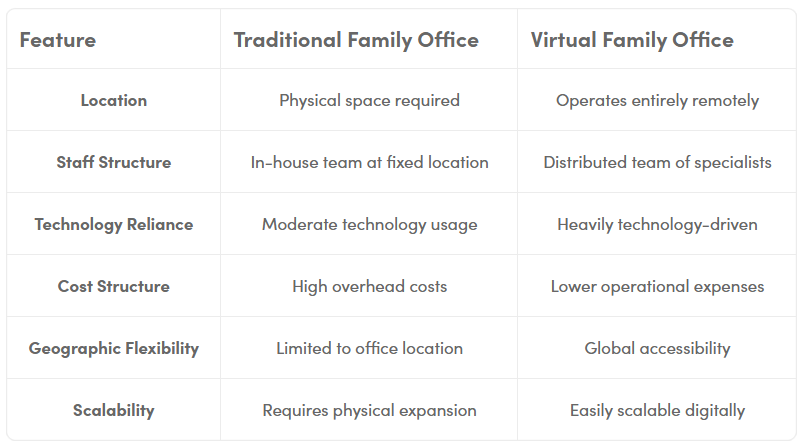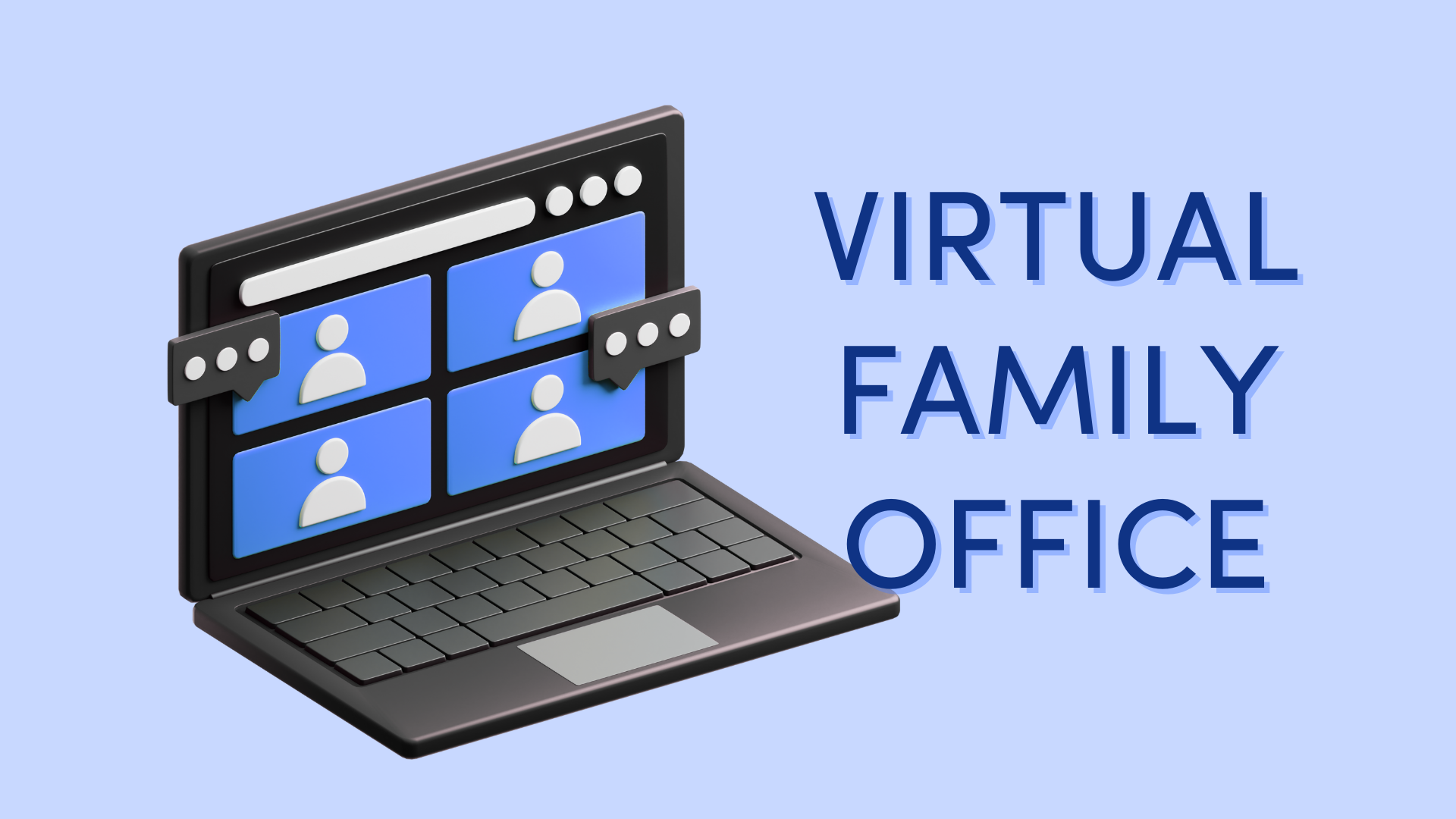Automate your family office
Schedule DemoHeading 1
Heading 2
Heading 3
Heading 4
Heading 5
Heading 6
Lorem ipsum dolor sit amet, consectetur adipiscing elit, sed do eiusmod tempor incididunt ut labore et dolore magna aliqua. Ut enim ad minim veniam, quis nostrud exercitation ullamco laboris nisi ut aliquip ex ea commodo consequat. Duis aute irure dolor in reprehenderit in voluptate velit esse cillum dolore eu fugiat nulla pariatur.
Block quote
Ordered list
- Item 1
- Item 2
- Item 3
Unordered list
- Item A
- Item B
- Item C
Bold text
Emphasis
Superscript
Subscript
TL;DR
A virtual family office provides comprehensive wealth management services through technology-driven platforms instead of physical office space. Virtual family offices offer cost-effective alternatives to traditional family office structures while maintaining personalized services for affluent families and family members across multiple locations.The days of requiring a physical office space and local staff to manage substantial family wealth are ending. Technology has transformed how wealthy families access sophisticated financial services, creating new opportunities for more flexible, cost-effective wealth management solutions.
Welcome to the virtual family office: a modern approach that delivers comprehensive family office services without the overhead costs and geographic limitations of traditional brick-and-mortar operations.
But what is a virtual family office exactly, and could it be the right solution for your family's wealth management needs?
What is a Virtual Family Office?
A virtual family office (VFO) is a technology-driven wealth management structure that provides comprehensive family office services to affluent families (with significant wealth) through digital platforms and remote collaboration tools. Unlike typical family office models that require office space and on-site staff, virtual family offices leverage digital infrastructure to deliver personalized financial services from anywhere in the world.
Virtual offices combine the expertise of seasoned financial professionals with modern technology platforms, creating a virtual office hub that serves as the central coordination point for all family wealth management activities. This approach enables families to access sophisticated investment management, tax planning, estate planning, and other core services without the substantial overhead costs associated with maintaining a physical presence.
Key Characteristics of Virtual Family Offices

Virtual Family Office Structure and Operations
Understanding virtual family office structure is crucial for families considering this modern wealth management approach. The structure typically consists of several interconnected components that work together to provide seamless service delivery.
Core Components of Virtual Office Structure
- Technology Infrastructure: The foundation of any virtual office structure includes secure communication platforms, cloud-based data storage, advanced financial software, and integrated reporting systems. This digital infrastructure enables real-time collaboration between family members and their advisory team regardless of geographic location.
- Distributed Advisory Team: Instead of maintaining an in-house team, virtual offices typically work with a network of independent professionals and specialized firms. Family office leadership might include investment managers, tax advisors, estate planners, and other experts who collaborate virtually to serve the family's needs.
- Virtual Office Hub: This serves as the central coordination point where all family financial information, communications, and strategic planning activities are managed. The hub typically includes comprehensive dashboards, document management systems, and communication tools that keep family members connected to their wealth management activities.
- Service Delivery Platforms: Modern virtual offices utilize sophisticated platforms that enable seamless delivery of core services including investment management, financial reporting, tax planning, and family governance support.
Virtual Family Office Services: What You Can Expect
Virtual family office services encompass the full range of wealth management capabilities that families require to preserve wealth, leveraging technology-enabled platforms and remote expertise.
Investment Management and Portfolio Oversight
Virtual offices provide comprehensive investment management services including:
- Family's portfolio construction across multiple asset classes and investment strategies
- Performance monitoring with real-time reporting and analytics
- Risk management tailored to each family's tolerance, financial objectives, and financial affairs
- Alternative investment access including private equity and hedge fund opportunities
- Tax-efficient investing strategies that minimize tax impact while maximizing returns
Financial Planning and Wealth Strategy
Estate Planning Coordination: Virtual family offices coordinate with estate planning attorneys and tax professionals to ensure that wealth transfer strategies align with overall family objectives and minimize tax implications for future generations.
Tax Planning and Compliance: Through partnerships with tax advisory firms, virtual family offices provide comprehensive tax planning that spans multiple jurisdictions and includes strategies for income optimization, estate tax minimization, and charitable giving coordination.
Family Governance Support: Many virtual family offices assist with family governance activities including virtual meeting facilitation, succession planning, and next-generation education programs that prepare family members for wealth stewardship responsibilities.
Administrative and Concierge Services
While virtual family offices primarily focus on wealth management, many also provide administrative support, concierge services, and a comprehensive suite that family members need:
- Bill payment and cash flow management
- Insurance coordination and risk assessment
- Document management and secure storage
- Philanthropic advisory and charitable giving coordination
- Lifestyle management support for complex personal affairs
Virtual Family Office Cost: Understanding the Economics
One of the most attractive aspects of virtual family office models is their cost efficiency compared to single family office or multi family office structures. Understanding virtual family office cost structures helps families evaluate whether this approach makes financial sense for their situation.
Cost Advantages of Virtual Family Offices
Reduced Overhead Expenses: Without office space, utilities, and full-time staff salaries, virtual family offices can operate with significantly lower overhead costs. These savings are typically passed on to client families through more competitive fee structures.
Scalable Service Delivery: Virtual family office services can be scaled up or down based on family needs without the fixed costs associated with physical operations. This flexibility allows families to access sophisticated services while paying only for what they actually use.
Elimination of Geographic Premiums: Family offices often charge premium fees in expensive markets like New York or London. Virtual family offices can access top talent regardless of location, avoiding geographic cost premiums.
Typical Virtual Family Office Cost Structure
Virtual family office costs typically range from 0.5% to 1.5% of assets under management, significantly lower than typical family office arrangements that often cost 1% to 2% or more.Â
The exact cost depends on:
- Scope of services required by the family
- Complexity of the family's financial situation
- Level of customization needed for specialized requirements
- Geographic considerations for multi-jurisdictional families
How to Set Up a Virtual Family Office
Many wealthy families wonder how to set up a virtual family office that meets their specific needs while leveraging the cost and flexibility advantages of virtual operations.
Step 1: Assess Your Family's Needs
Before exploring how to start a virtual family office, conduct a comprehensive assessment of your family's wealth management requirements:
- Investment Management Needs: Evaluate the complexity of your investment portfolio, alternative investment interests, and performance monitoring requirements.
- Family Governance Requirements: Consider whether your family needs governance support, succession planning assistance, or next-generation education programs.
- Administrative Complexity: Assess the level of administrative support your family requires for financial affairs, tax compliance, and lifestyle management.
- Geographic Considerations: Determine how important physical proximity is for your family's comfort level and communication preferences.
Step 2: Evaluate Virtual Family Office Options
When researching the best virtual family office options, consider these key factors:
- Technology platform capabilities and user experience
- Quality and credentials of the advisory team
- Service breadth and customization options
- Fee structure transparency and cost competitiveness
- Security measures for protecting sensitive financial information
- Client references and track record with similar families
Step 3: Implementation and Onboarding
The process of how to start a virtual family office engagement typically involves:
- Data Migration: Transferring financial information, account access, and important documents to the virtual family office platform.
- Service Customization: Configuring the virtual family office services to match your family's specific requirements and preferences.
- Team Introduction: Meeting the advisory professionals who will be working with your family and establishing communication protocols.
- Platform Training: Learning how to use the technology tools and platforms that will facilitate ongoing collaboration and information access.
Comparing Virtual Family Offices to Traditional Models
Understanding how virtual family offices compare to typical single family office and multi family office structures helps families make informed decisions about their wealth management approach.
Virtual Family Office vs. Single Family Office
- Cost Efficiency: Virtual family offices typically cost 30-50% less than establishing a traditional single family office, making sophisticated wealth management accessible to families with $25-100 million in assets rather than requiring $100+ million.
- Flexibility: Virtual family office structure allows for greater geographic flexibility and easier scaling of services compared to traditional single family office operations.
- Control: Traditional single family offices provide more direct control over staff and operations, while virtual family offices require more trust in external service providers.
Virtual Family Office vs. Multi Family Office
- Customization: Virtual family offices often provide more customization than multi family office arrangements while maintaining cost efficiency through technology-enabled operations.
- Access: Both models provide access to institutional-quality investment opportunities, but virtual family offices may offer more flexibility in service delivery and communication.
- Community: Multi family office arrangements typically provide more opportunities for family networking and peer learning, while virtual family offices focus primarily on service delivery.
Technology and Security in Virtual Family Offices
Modern virtual family offices rely heavily on sophisticated technology platforms that enable secure, efficient service delivery across multiple locations and time zones:
- Secure Communication Platforms: Encrypted video conferencing, messaging systems, and collaboration tools that enable real-time communication between family members and advisory teams.
- Portfolio Management Systems: Comprehensive platforms that provide real-time portfolio monitoring, performance analytics, and managing investment research capabilities.
- Document Management: Secure, cloud-based systems for storing and sharing important financial documents, legal papers, and family governance materials.
- Reporting and Analytics: Advanced reporting tools that provide customized performance reports, risk assessments, and strategic wealth planning support.
Virtual family offices must implement robust security measures to protect sensitive financial information:
- Multi-factor authentication for all platform access
- End-to-end encryption for all communications and data storage
- Regular security audits and vulnerability assessments
- Compliance protocols that meet regulatory requirements
- Disaster recovery planning to ensure business continuity
Choosing the Best Virtual Family Office
Selecting the best virtual family office for your family requires careful evaluation of multiple factors beyond just cost considerations.
- Advisory Team Quality: Assess the credentials, experience, and track record of the professionals who will be managing your family's wealth. Look for teams with experience serving families similar to yours in terms of wealth level and complexity.
- Technology Platform: Evaluate the user experience, functionality, and security of the virtual family office hub that you'll be using to access information and communicate with your advisory team.
- Service Breadth: Check that the customized services cover your family currently needs while having the capability to add services as your needs evolve.
- Cultural Fit: Consider whether the virtual family office's communication style, values, and approach align with your family's values, preferences, and expectations.
Red Flags to Avoid
When evaluating virtual family offices, watch for these potential warning signs:
- Lack of transparency about fees, conflicts of interest, or service limitations
- Inadequate security measures or reluctance to discuss cybersecurity protocols
- Limited client references or unwillingness to provide testimonials
- Overly aggressive promises about investment performance or cost savings
- Poor communication during the evaluation process
The Future of Virtual Family Offices
Virtual family offices represent a growing trend in wealth management as technology continues to improve and wealthy families become more comfortable with digital service delivery.
- Artificial Intelligence Integration: Advanced analytics and AI-powered insights are becoming standard features in virtual family office platforms, providing better investment research and risk management capabilities.
- Blockchain and Digital Assets: Virtual family offices are increasingly incorporating cryptocurrency and digital asset management into their service offerings (with asset protection, too).
- Global Accessibility: Improved technology is making it easier for virtual family offices to serve families across multiple jurisdictions and time zones effectively.
- Specialized Services: Virtual family offices are developing more specialized offerings for specific family needs, such as family business succession planning or impact investing coordination.
Making the Virtual Family Office Decision
Virtual family offices represent a compelling alternative for families seeking sophisticated wealth services without the substantial costs and geographic limitations of traditional family office structures. The combination of advanced technology, experienced professionals, and cost-efficient operations makes virtual family offices an attractive option for many families.
The key to success with a virtual family office lies in choosing the right provider that understands your family’s unique needs, provides robust technology platforms, and maintains the highest standards for security and service delivery.
As technology continues to evolve and wealthy families become increasingly global, virtual family offices are likely to play an expanding role in the wealth management landscape. For families ready to embrace this modern approach, virtual family offices offer the opportunity to access institutional-quality management services while maintaining the flexibility and cost efficiency that traditional structures often cannot provide.
Whether you’re exploring alternatives to expensive traditional family office arrangements or seeking more flexible wealth management solutions for a geographically dispersed family, virtual family offices deserve serious consideration as part of your wealth management strategy.
Want to see how modern family office software can transform your wealth management? Schedule a demo with our team for a hands-on look.
Frequently Asked Questions
What is a virtual family office and how does it differ from traditional family offices?
A virtual private family office provides comprehensive management services through technology platforms instead of office space. Unlike typical family offices that require substantial overhead for staff and facilities, virtual family offices use digital tools and remote expertise to deliver personalized financial services at lower costs while maintaining high service quality.
What are the typical virtual family office costs compared to traditional options?
Virtual family office costs typically range from 0.5% to 1.5% of assets under management, compared to 1% to 2%+ for typical family offices. The cost savings come from reduced overhead expenses, no physical office requirements, and more efficient service delivery through technology platforms.
How do I know if a virtual family office is right for my family?
Virtual family offices work well for families with $25-100 million in assets who want sophisticated wealth management services without the costs of a traditional single family office. They're ideal for geographically dispersed families, those comfortable with technology, and families who prioritize cost efficiency while maintaining high service quality.
How do virtual family offices ensure security and privacy of sensitive financial information?
The best virtual family office providers use bank-level security including multi-factor authentication, end-to-end encryption, secure cloud storage, and regular security audits. They also implement strict access controls and compliance protocols to protect client data and maintain confidentiality.
Can virtual family offices provide the same level of personalized service as traditional family offices?
Yes, virtual family offices can provide highly personalized services through dedicated advisory teams and customized technology platforms. While the interaction model is different, many families find virtual family office services more responsive and accessible than traditional arrangements, especially for families with members in multiple locations.











